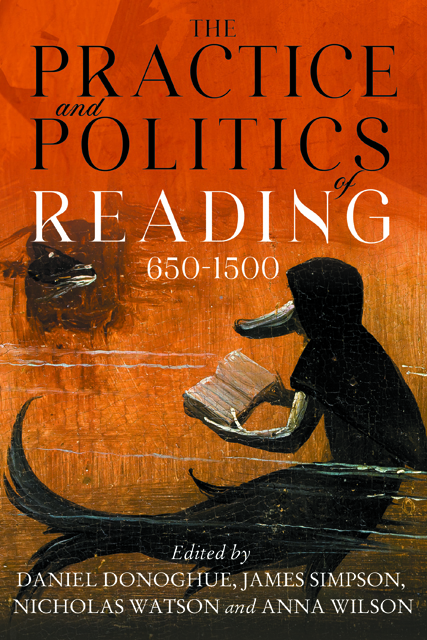1 - Literally, What Did Medieval Readers See?
Published online by Cambridge University Press: 11 January 2023
Summary
To say that reading is central to literary studies is so obvious it seems like a truism, like saying that dancing is important to a dancer. And yet for something so fundamental we understand precious little of reading as a physical and cognitive activity. A dancer, especially one who undergoes training, gains a deep understanding of the human body’s physical capacity to move because it has been analyzed and taught by practitioners for centuries. The human capacity to read, by contrast, has been largely ignored by humanists. Much of our attention has gone in two complementary directions: fields like paleography and the history of the book attend to the material production of texts and literary criticism attends to the interpretation of them. The crucial activity standing between production and interpretation has been like a black box, with text entering on one end and comprehension somehow emerging on the other. Can our work as humanists benefit from a better understanding of reading? Why has the activity of reading been so resistant to study? We can begin to answer these questions by noting that under the right circumstances reading can seem effortless, even though the steps involved in going from viewing marks on a writing surface to mental comprehension are formidably complex. Competent readers may be aware of this complexity only during moments of difficulty, such as poor light, fuzzy eyesight, or mental fatigue. Even though reading is as miraculous as it is effortless, we accept it as something that does not ask for further inquiry. Our personal computers may provide a parallel: we can be blissfully unaware of the complex things they do until there is a problem. When they function well, we accept the benefits and get on with our business. The analogy is imperfect, however, because of the indispensable role of reading in everything we do as humanists; a personal computer is a tool we can set aside.
In the past few decades, cognitive psychologists have gained remarkable insights into the complex choreography between the eyes and brain during even the simplest act of reading, but this work has gone largely unheeded in the humanities.
- Type
- Chapter
- Information
- The Practice and Politics of Reading, 650-1500 , pp. 21 - 41Publisher: Boydell & BrewerPrint publication year: 2022



